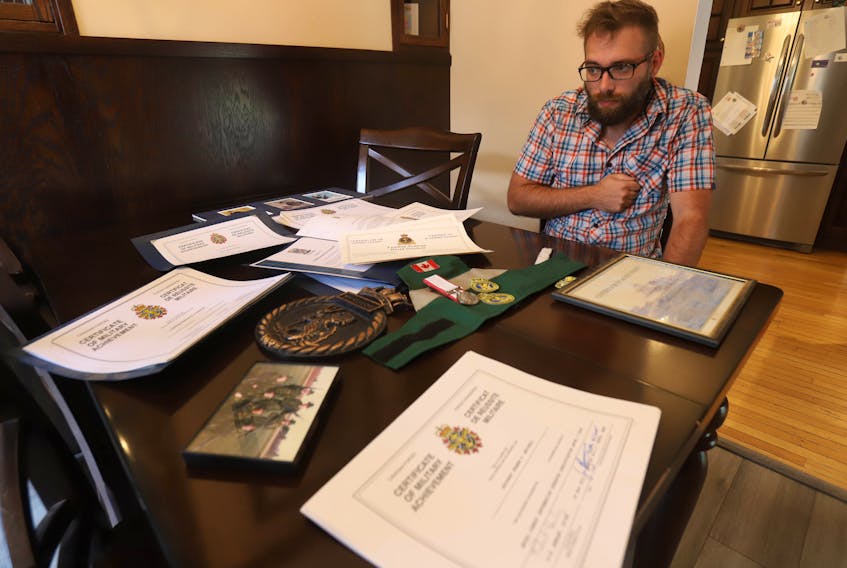When David Getchell signed on to fight for queen and country, he never imagined a royal run-in would end his dream of becoming a submariner.
Getchell was just denied a disability pension for anxiety and a painful chest condition he believes was exacerbated by delays calling an ambulance in October of 2015 when the Prince of Wales visited the Halifax-based sub in Faslane, Scotland.
“I don’t blame Prince Charles. I honestly don’t think he had a clue,” Getchell said in a recent interview from his Cole Harbour home. “And honestly, if he did, I think he would have just told them to call an ambulance.”
There was a lot of navy brass aboard that day, Getchell said.
“It was like basically they didn’t want some leading seaman to ruin this moment for them,” Getchell said. “So stuff him in a room until the prince leaves.”
HRH, The Prince Charles, and Commodore-in-Chief of CANFLTLANT exchange greetings with XO #HMCS #Windsor on Oct 3 pic.twitter.com/dXss8EYtN8
— MARLANT (@RCN_MARLANT) October 5, 2015
The navy’s submarine service didn’t have much to say about the incident.
“We cannot comment on the particulars of the event as described as it is linked to the member’s medical history, and as such, is protected under the Privacy Act,” Lt.-Cmdr. Tony Wright said in a written response to questions about what happened that day.
“The Royal Canadian Navy takes the safety and welfare of its personnel seriously and every effort is made to ensure the physical and emotional safety of our sailors, submariners, and defence team members whether deployed or at home.”
Windsor’s crew had stayed in a Glasgow hotel the night before the royal visit. They boarded a bus Oct. 3, 2015 to return to the sub.
“I just felt horrible,” Getchell said. “I just felt drained.”
The then-28-year-old passed out during the 40-minute bus ride.

Master Seaman Duncan Carter said in a witness statement that he was getting off the bus when he noticed Getchell appeared to be asleep in his seat.
“I gave him a slight poke to wake him up but got no response,” Carter said in his statement.
"I noticed his skin was pale and that his eyes were open.”
Carter and another crewmate “attempted to get him to come around.” When Getchell didn’t respond, they called for the sub’s medic, who arrived as Getchell came to. “He stated he was okay, just very tired and insisted he didn’t need any medical attention,” Carter said in his statement.
“It had to be about five minutes, maybe 10, before the prince showed up, my medical condition hit me like a ton of bricks.”
- Former Leading Seaman David Getchell
Getchell remembers regaining consciousness at the submarine base in Faslane with some of his crewmates slapping him on the face to wake him up.
“I felt weird. My left arm was numb,” said Getchell, now 33.
Windsor’s medic tried to help. “He gave me some Gatorade and some Tylenol and said you’re probably just dehydrated,” Getchell said.
Carter said he walked with Getchell to the submarine. “He appeared pale still and stated during the walk that he had no feeling in a couple of fingers on one hand.”
One of the few aboard who played the bosun’s pipe, Getchell had volunteered for the piping party planned to welcome the prince on to Windsor.
“But then I couldn’t do it,” he said. “It had to be about five minutes, maybe 10, before the prince showed up, my medical condition hit me like a ton of bricks.”
Suddenly his whole left arm felt like “there was a thousand knives going through it.” Getchell took a knee, experienced tunnel vision, and asked for help.
Getchell said Windsor’s coxswain ordered that he be taken below in the submarine.
“They put me in the communications room,” he said. “That room is the most secure room in the submarine. It has all the crypto and everything in it. It's soundproof. It has like a hundred locks on the door … The prince wasn’t going to go in there.”
The medic stayed with him, trying to keep Getchell hydrated.

Witness statements say Getchell was in the communications room for an hour while the prince toured the sub and chatted with its crewmembers.
“I was getting worse and worse and worse really fast,” he said. “The pain got so bad I ended up losing consciousness a few times. I wasn’t going quietly. I was screaming for my life. But no one could hear me except for the (medic).”
In a witness statement, Lt. Marshall Luton said he checked on Getchell periodically in the radio room. “I heard him say the pain came and went; feeling sometimes like he was faint and other times like a horse was standing on his chest.”
“There was a complete disregard for the safety and well-being of LS Getchell as the focus was on the VVIP’s visit.”
- Wintess statement
Sgt. Joshua Collins, a cook aboard the submarine who had served two tours in Afghanistan, said in a witness statement that no ambulance was called during the time Prince Charles was aboard. “This decision did not happen until the VVIPs had departed,” Collins said in his statement.
With symptoms resembling a heart attack, the crew eventually hauled Getchell out of the sub on a stretcher.
“There was a complete disregard for the safety and well-being of LS Getchell as the focus was on the VVIP’s visit,” Collins said in his statement. “It appeared (and to other crewmembers) that they kept LS Getchell out of sight as to not interfere with the guest’s visit. This decision has me questioning myself whether or not my safety is a priority to the senior leadership if this emergency had happened to me. This decision may have cost LS Getchell his life or (caused) long-term disability/ health issues.”
Paramedics took Getchell to hospital.
“At the hospital they found out I had pericarditis, which is inflammation of the sack around your heart,” he said. “So my heart was being squeezed and that was causing a lot of my pain.”
They gave him morphine and antibiotics at the hospital and he’s not experienced a similar attack.
“I have had the chest pain, though, every day since,” Getchell said. “When I got back to Canada I saw a bunch of specialists.”

Once he was flown home, one doctor’s theory was the pericarditis had been caused by a virus Getchell could have had for months. “He thinks that infection in my heart moved to my ribs and that’s what’s causing my chronic pain.”
Getchell ballooned from a slim 160 pounds to 230 pounds due to inactivity.
He’s since lost much of that extra weight through regular walking, but Getchell never stepped foot on a submarine again.
“I always wanted to go subs when I joined the navy from Day 1,” said Getchell, who served aboard surface ships HMCS St. John’s and HMCS Halifax before he was accepted into the submarine program.
Before Windsor left for Europe, Getchell was happy to do exercises aboard Windsor with the military’s elite JTF2 off the coast of Halifax.
“I always wanted to go subs when I joined the navy from Day 1.”
- David Getchell
“They come down in a helicopter as fast as they can and they land on the submarine,” he said. “They land right on the tip. It was crazy. It was great stuff. We did that for a few weeks before we left for Scotland, which was awesome.”
While he wasn’t a fully trained submariner, Getchell filled the role for the transatlantic voyage.
“It was all good until that trip,” he said of crossing the Atlantic Ocean on Windsor to Norway and Scotland.
“I had some discomfort in my chest for a while that I was ignoring. But I did go to the military hospital in Stadacona (to get it checked out about a month before the trip),” he said. “They said it was stress.”
Then a leading seaman, Getchell was training to be a naval combat information operator. “I controlled the radar system on board and plotting other ships and contacts. We’d drive the submarine as well.”
Getchell said he loved the job and he was hoping to win one of the coveted dolphin insignias that would identify him as a Canadian submariner.
“It was the best of the best. You don’t just go submarines. You have to volunteer and it took me about two years to get in,” he said, noting if you do get in, “you’re part of something special.”
The job is normally a fast-track to moving up in the ranks, he said. “It’s a prestige thing. You get more money out of it. You get promoted 10 times faster. It’s what you do if you want to go places.”
Life after the incident
Getchell, who joined the regular force in 2010, left the navy last October.
“I was in the military for four more years working from home,” he said.
“I was never given any task. I was never given anything really … They just sent me home and forgot about me.”
Getchell has lived with chest pain due to inflammation of the cartilage in his ribs ever since the incident aboard the submarine.
“I’m still in chronic pain. I’m in rough shape,” he said. “The whole thing just kind of ruined me.”
Getchell’s getting cortisone shots for the pain now, which has allowed him to get around more.
“There’s no cure for the ailment. He’s numbing my nerves in my chest,” Getchell said of the doctor who administers the cortisone.
“... I also don’t think I’d be in this situation if they treated me like a normal person … If they’d just called an ambulance when I needed it instead of waiting an hour.”
- David Getchell
While he was still in uniform, Getchell said he repeatedly asked his chain of command why he wasn’t hustled off the submarine before Prince Charles arrived to tour Windsor.
“I never got any answers,” he said. “I did get an apology in a closed room where no one would see it.”
That came about two years after the incident from the sub’s commander, second-in-command, combat officer and coxswain, he said. “They all just said sorry and that was it.”
Getchell said they assured him he would be taken care of. “They just said everything that I wanted to hear. I was really angry and I just wanted some help at the time. It sounded like they were going to (help), so I didn’t make a fuss.”
Then the letter from Veterans Affairs Canada arrived this month denying Getchell compensation for pain and suffering.
“We acknowledge you relate your illness ... to your service,” says the decision dated Sept. 2 from a disability adjudicator. “However, the medical evidence reveals no service-related factors caused your illness … therefore we cannot establish a service relationship between your claimed condition and your regular force service.”
Getchell said he was never a complainer before the Faslane incident.
“I didn’t want to be that guy,” he said. “I broke my foot once (dropping a cannon on it while practicing for the gun run before the 2011 Tattoo) and I never went to the hospital … because I wanted to be a gun runner.”
Getchell plans to appeal the compensation decision and file a human rights complaint with the Canadian Forces for the way he was treated on the day the prince visited HMCS Windsor.
“I honestly don’t think they caused it,” Getchell said of the submarine’s top people. “But I also don’t think I’d be in this situation if they treated me like a normal person … If they’d just called an ambulance when I needed it instead of waiting an hour.”









